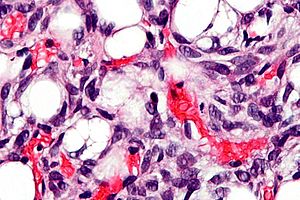Liposarcoma
Jump to navigation
Jump to search
Liposarcoma is a malignant adipocytic tumour.
| Liposarcoma | |
|---|---|
| Diagnosis in short | |
 Liposarcoma. H&E stain. | |
|
| |
| LM | lipoblasts - key feature, chicken wire-like vascular, +/-myxoid background, cell size variation, thick fibrous septa (important low power feature) |
| Subtypes | dedifferentiated liposarcoma, myxoid liposarcoma (includes round cell liposarcoma), mixed-type liposarcoma, pleomorphic liposarcoma, liposarcoma not otherwise specified (NOS), spindle cell liposarcoma |
| LM DDx | pleomorphic undifferentiated sarcoma |
| IHC | S-100 +ve |
| Molecular | t(12;16)(q13;p11) / TLS-CHOP -- for myxoid liposarcoma |
| Site | soft tissue esp. retroperiteoneum |
|
| |
| Prevalence | most common retroperitoneal sarcoma, uncommon overall |
| Blood work | D-dimer elevated |
| Radiology | thick septae or nodules in a fatty appearing lesion |
| Prognosis | poor |
General
- Most common malignant sarcoma in the retroperitoneum.
- Not all (large) retroperitoneal adipocytic tumours are liposarcomas.
- Prognosis - dependent on the location.
- Retroperitoneal: poor.
- Extremity: good - disease specific 5-year survival ~ 92%.[1]
- D-dimer (serum) useful; elevated levels in keeping with liposarcoma.
Notes:
- Retroperitoneal sarcomas: #1: liposarcoma, #2: pleomorphic undifferentiated sarcoma, #3: leiomyosarcoma, #4: MPNST.
- Extremely rare in retroperitoneum: synovial sarcoma.
Gross
- Thick fibrous septa
Radiology:[3]
Microscopic
Features:
- Lipoblasts - key feature.
- Large sharply demarcated vacuole.
- Nucleus:
- Hyperchromatic (dark staining) nucleus.
- Eccentric location.
- Nuclear indentation.
- Chicken wire-like vascular.
- +/-Myxoid background.
- Cell size variation.
- Thick fibrous septa - important low power feature.[3]
DDx:
Images
www:
Subtypes
Main subtypes:[5]
- Dedifferentiated liposarcoma.
- Myxoid liposarcoma.
- Mixed-type liposarcoma.
- Pleomorphic liposarcoma.
- Liposarcoma not otherwise specified (NOS).
Additional reported type:
- Spindle cell liposarcoma.[8]
Myxoid liposarcoma
Gross
Location:[9]
- 90% in lower limb.
- 81% deep.
Microscopic
Features:
- Chickenwire-type blood vessels.
- Clear spaces.
- Adipocytes - may be rare.
DDx:
Images:
- Myxoid liposarcoma (rsna.org).[10]
- Myxoid liposarcoma - among other things (rsna.org).[4]
- Myxoid liposarcoma (cap.org).
Molecular
Typically has a translocation:
- t(12;16)(q13;p11) TLS-CHOP.[11]
- May have the translocation usually seen in clear cell sarcoma:
- t(12;22)(q13;q12) EWS-ATF1.[12]
Dedifferentiated liposarcoma
- Has an undifferentiated component that, if seen alone, would be diagnosed as pleomorphic undifferentiated sarcoma.
- The diagnosis depends on the presence of the differentiated component of the tumour, i.e. the presence of lipoblasts.
IHC
See also
References
- ↑ Lietman, SA.; Barsoum, WK.; Goldblum, JR.; Marks, KE.; Mascha, E.; Sundaram, M.; Muschler, G. (Mar 2007). "A 20-year retrospective review of surgically treated liposarcoma at the Cleveland Clinic.". Orthopedics 30 (3): 227-34. PMID 17375550.
- ↑ 2.0 2.1 Morii T, Mochizuki K, Tajima T, Ichimura S, Satomi K (November 2011). "D-dimer levels as a prognostic factor for determining oncological outcomes in musculoskeletal sarcoma". BMC Musculoskelet Disord 12: 250. doi:10.1186/1471-2474-12-250. PMC 3226444. PMID 22044610. https://www.ncbi.nlm.nih.gov/pmc/articles/PMC3226444/.
- ↑ 3.0 3.1 Hosono, M.; Kobayashi, H.; Fujimoto, R.; Kotoura, Y.; Tsuboyama, T.; Matsusue, Y.; Nakamura, T.; Itoh, T. et al. (Mar 1997). "Septum-like structures in lipoma and liposarcoma: MR imaging and pathologic correlation.". Skeletal Radiol 26 (3): 150-4. PMID 9108224.
- ↑ 4.0 4.1 4.2 Murphey, MD.; Arcara, LK.; Fanburg-Smith, J.. "From the archives of the AFIP: imaging of musculoskeletal liposarcoma with radiologic-pathologic correlation.". Radiographics 25 (5): 1371-95. doi:10.1148/rg.255055106. PMID 16160117.
- ↑ Humphrey, Peter A; Dehner, Louis P; Pfeifer, John D (2008). The Washington Manual of Surgical Pathology (1st ed.). Lippincott Williams & Wilkins. pp. 601. ISBN 978-0781765275.
- ↑ Smith, TA.; Easley, KA.; Goldblum, JR. (Feb 1996). "Myxoid/round cell liposarcoma of the extremities. A clinicopathologic study of 29 cases with particular attention to extent of round cell liposarcoma.". Am J Surg Pathol 20 (2): 171-80. PMID 8554106.
- ↑ Conyers, R.; Young, S.; Thomas, DM. (2011). "Liposarcoma: molecular genetics and therapeutics.". Sarcoma 2011: 483154. doi:10.1155/2011/483154. PMID 21253554.
- ↑ Dei Tos, AP.; Mentzel, T.; Newman, PL.; Fletcher, CD. (Sep 1994). "Spindle cell liposarcoma, a hitherto unrecognized variant of liposarcoma. Analysis of six cases.". Am J Surg Pathol 18 (9): 913-21. PMID 8067512.
- ↑ Moreau, LC.; Turcotte, R.; Ferguson, P.; Wunder, J.; Clarkson, P.; Masri, B.; Isler, M.; Dion, N. et al. (Apr 2012). "Myxoid\Round Cell Liposarcoma (MRCLS) Revisited: An Analysis of 418 Primarily Managed Cases.". Ann Surg Oncol 19 (4): 1081-1088. doi:10.1245/s10434-011-2127-z. PMID 22052112.
- ↑ Sung, MS.; Kang, HS.; Suh, JS.; Lee, JH.; Park, JM.; Kim, JY.; Lee, HG.. "Myxoid liposarcoma: appearance at MR imaging with histologic correlation.". Radiographics 20 (4): 1007-19. doi:10.1148/radiographics.20.4.g00jl021007. PMID 10903690.
- ↑ Knight, JC.; Renwick, PJ.; Dal Cin, P.; Van den Berghe, H.; Fletcher, CD. (Jan 1995). "Translocation t(12;16)(q13;p11) in myxoid liposarcoma and round cell liposarcoma: molecular and cytogenetic analysis.". Cancer Res 55 (1): 24-7. PMID 7805034.
- ↑ Suzuki, K.; Matsui, Y.; Endo, K.; Kubo, T.; Hasegawa, T.; Kimura, T.; Ohtani, O.; Yasui, N. (Nov 2010). "Myxoid liposarcoma with EWS-CHOP type 1 fusion gene.". Anticancer Res 30 (11): 4679-83. PMID 21115923.
- ↑ 13.0 13.1 Mariño-Enríquez, A.; Hornick, JL.; Dal Cin, P.; Cibas, ES.; Qian, X. (Feb 2014). "Dedifferentiated liposarcoma and pleomorphic liposarcoma: a comparative study of cytomorphology and MDM2/CDK4 expression on fine-needle aspiration.". Cancer Cytopathol 122 (2): 128-37. doi:10.1002/cncy.21362. PMID 24227706.